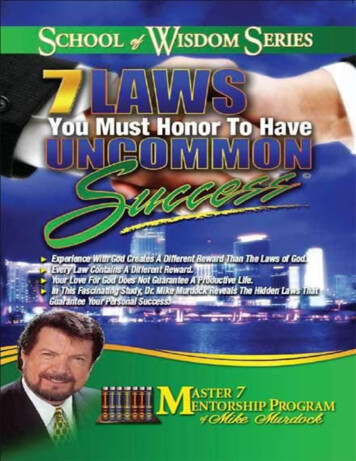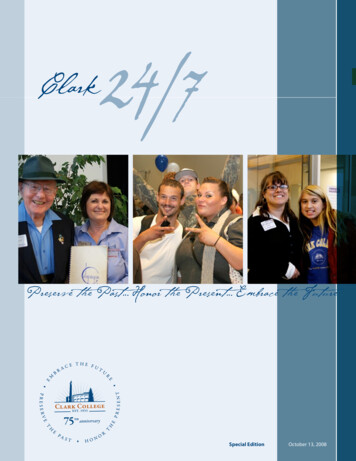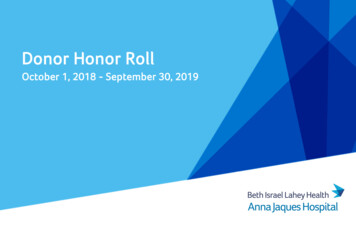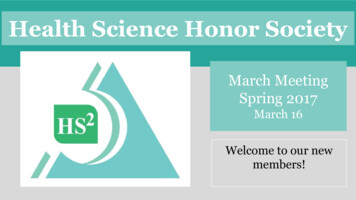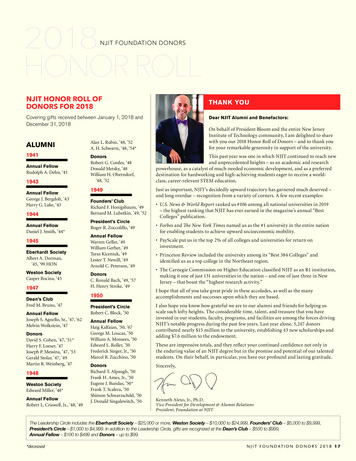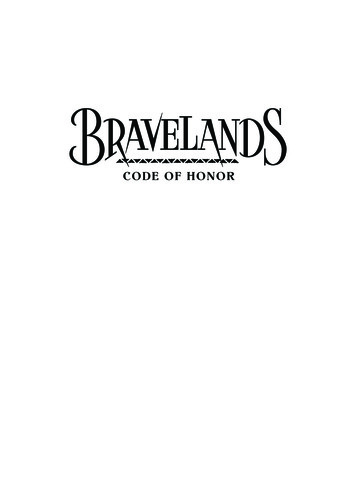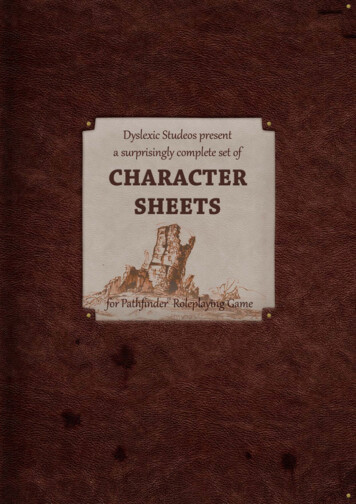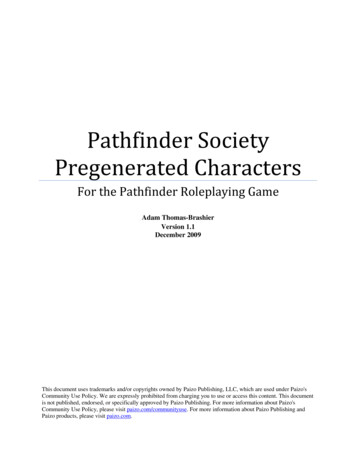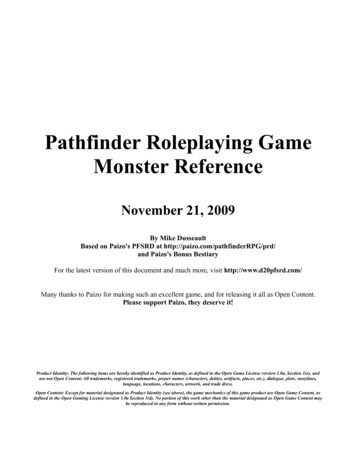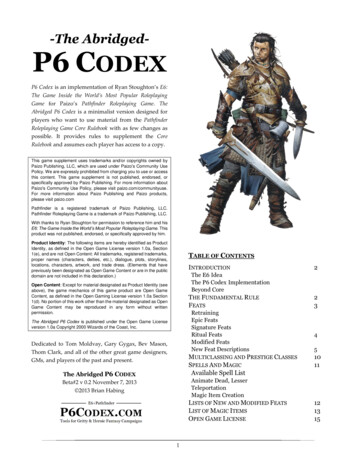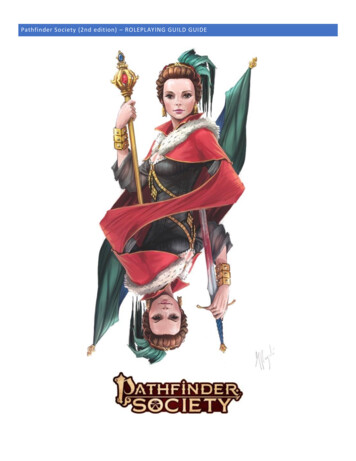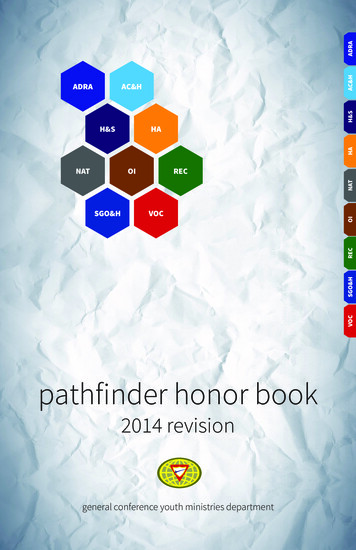
Transcription
COISGO&Hpathfinder honor book2014 revisiongeneral conference youth ministries department-1-
ADRAAC&HH&SNATHAOISGO&HRECVOCpathfinder honor book2014 revisiongeneral conference youth ministries department-3-
General Conference Youth Ministries Department Director: Gilbert CangyGeneral Conference Associate Youth Director/Pathfinder World Director: Jonatan TejelGeneral Conference Honors Committee:Jonatan Tejel, ChairmanVanessa Correa, SecretaryGennady Kasap: ESD Youth DirectorBusi Khumalo: SID Youth DirectorMark O’Ffill: NAD representativeJohn Sommerfeld: SPD representativePaul Tompkins: TED Youth DirectorJobbie Yabut: SSD Youth DirectorUdolcy Zukowski: SAD Pathfinder DirectorCopyright 2014 by the Youth Ministries Department of the Seventh-day Adventist ChurchAll rights reserved. Published 2014First edition published 1998. Second edition 2011. Third edition 2014Rights for publishing this book outside the U.S.A. or in non-English languages areadministered by the Youth Ministries Department of the Seventh-day Adventist Church. For additional information, please visit our website, www.gcyouthministries.org, email youthinfo@gc.adventist.org, or write to Youth Ministries Department,General Conference of Seventh-day Adventists Church, 12501 Old Columbia Pike,Silver Spring, MD 20904, U.S.A.Cover and inside design by Jonatan TejelPrinted in the United States of America-4-
Table of ContentsPhilosophy of the Pathfinder Honors6Introduction7Guidelines for Participating in the Pathfinder Honor Program8Advanced Honors: A Glimpse Toward the Future8Check List for Evaluating New Pathfinder Honors9Approval Procedure for a New Pathfinder Honor10Instructions for Completing New Honor Worksheet10Worksheet for developing new Pathfinder Honors11ADRA13Arts, Crafts, & Hobbies27Health & Science131Household Arts157Nature181Outdoor Industries289Recreation309Spiritual Growth, Outreach, & Heritage415Vocations469Master Awards519-5-
Philosophy of the Pathfinder HonorsEach honor is designed to be a course of study that introduces a subject.This subject should have practical value and should enhance the lifestyleof the person pursuing the honor. Honor study should assist the person inhis/her development as a well-rounded Christian by directly affecting thesocial, emotional, physical, and spiritual aspects of life. The study of anhonor should direct the person to a deeper love of the Creator and shouldincrease one’s interest in committing their life in service to God and to thecommunity.Honor study is intended to help the person’s spiritual characterdevelopment. Therefore, every honor should be designed to require highstandards of excellence by clearly stating in all requirements what tasksare to be accomplished. Fulfilling the requirements should be interestingand fun, while at the same time providing the person with a sense ofachievement.The study of an honor should provide a person with an attractive wayto learn about their surroundings or widen their exposure to new horizonsof adventures. Such study topics might include learning about hobbies, aspecial interest, or being introduced to a new vocation. Each honor should bedesigned to accomodate group study of a club meeting, family, or individualstudy by a highly motivated person. The entire content of the honor shouldbe capable of being completed in less than three months.Because Pathfinder honors are a part of a church-sponsored program,all facets of course study should be in harmony with basic church standards.For this reason honor study would normally avoid topics with requirementscalling for destruction of plant or animal life as well as types of armedof unarmed defense. Also, subjects should be avoided that could only bestudied by a small group of people in a single local area.It is the purpose of all honors to help the person to “increase in wisdomand stature and in favor with God and man.”-6-
IntroductionThis 2014 Edition of the Pathfinder Honor Handbook is representative ofthe continual growth of Youth Ministry in the Seventh-day Adventist Church.We live in a rapidly changing world, consequently this book is quitelikely outdated as of press time. The honors reflect this fact as they nowundergo continual systematic revisions in order to provide nothing but thebest for our youth. By design and definition, honors are “windows to beopened in the mode of discovery” within the philosophical framework of thechurch. You can find, however, all the honors are updated automatically inour official GC Youth Ministries website: gcyouthministries.org.This manual includes all honors currently recognized at the GeneralConference level of Youth Ministry, produced in various divisions.The original concept of honors was agreed to at a General ConferenceYouth Advisory in 1927. They were first called Vocational Merits, then theybecame Vocational Honors. The first handbook listing the requirementswas published in 1928. At that time there were 16 topics selected. Whilerequirements have changed and names have been modified, those originalhonors remain today. Often these patches were hand-sewn on treadlemachines; some were sewn in private sewing rooms utilizing the pictureddesign as a pattern. These original patches have a quaint appearance whencompared to today’s computer-generated designs sewn on high precisionmachines at the Lion Brothers plant near Baltimore, Maryland in the USA.Down through the years other honors have joined these original 16 andtoday there are 414 Pathfinder honors recognized worldwide as well as 12Master Awards.It is the desire of the General Conference Youth Department that thisedition of the Pathfinder Honor Handbook will lead you into many newadventures as you discover the world around you. We also hope that thesevery enjoyable activities will prepare young people for the world to come.-7-
Guidelines for Participating in the Pathfinder Honor ProgramAdventist youth follow in a long tradition of service to humanity. Theycan be found all over the world applying their skills to the myriad tasksand many vocations and professions needed to carry the “gospel to all theworld in this generation.” Many Adventist youth who are now successful inoverseas mission service, in business or professional work, trace their visionof service to the Pathfinder honor system.We all should be able to draw from the great book of nature lessonsthat will inspire and enable others to emulate the example of Jesus, thegreatest nature Teacher this world has ever known. Youth should know howto place truth-filled literature in the hands of those who may thus be led tothe Savior. Every young person must be prepared to answer the call of theMaster in many fields of endeavor.The Youth Ministries Department desires to help young people reachthese ideals, and Pathfinder honors enable young people to gain proficiencyin many areas. Sometimes study for honors leads to the adoption of avocation or at least a useful hobby. While some may consider Pathfinderhonors as just study, theory, and book work, remember that the Pathfinderhonor system is based on the philosophy, “an ounce of theory to a pound ofpractice.” Enjoyment and adventure are the keys to any honor achievement.Advanced Honors: A Glimpse Toward the FutureThere have always been those persons who would like to see evengreater challenges in a given honor. This desire created the concept ofAdvanced Honors. To reduce production costs and provide interested personswith additional levels, advanced levels will be written for every honor. Asthese sets of requirements come into existence, a small bronze star will beavailable to be attached to the patch.-8-
Check List for Evaluating New Pathfinder HonorsCheck to see if the honor (or a similar one) already hfinders/Honors/tabid/85/Default.aspxIf no existing honor is found, please complete the followingrequirements:1. The honor requirements must uphold the standards and philosophy ofthe Seventh-day Adventist church.2. The honor requirements must include a balance of theory and “handson” activities.3. If possible, requirements should be developed on two levels of study:Basic (ages 10-15), and Advanced (ages 16 and older). Having the basichonor should be the pre-requisite for earning the advanced honor on agiven subject.4. Requirements should be usable in a group setting or by a singleindividual.5. Requirements should be able to be completed in less than three months.This is a general rule only as some honors (e.g. Outdoor Industriescategory) need more time.6. Requirements should clearly state in simple terminology exactly whatis to be accomplished. (Avoid ambiguous words or phrases such as“explain briefly,” or “demonstrate ability.”)7. Requirements must consider care of our natural environment. Forexample, to avoid destruction of animal or plant life, ask for photos ordrawings rather than collections.8. Activity requirements of extended time are worded so as to avoidconflicts with school or work schedules (e.g. a four day campout couldbe done in two weekends).9. All requirements are to be accomplished in a safe and supervisedenvironment. They must comply with legal requirements and will avoidinvolvement in armed or unarmed defenses.10. Requirements should be able to be accomplished without undulyaffecting the safety of its participants.11. The requirements should reflect current practice and language.-9-
Approval Procedure for a New Pathfinder Honor1.All new honor requests should be submitted to the local conferencePathfinder director for verification that the honor has met criteria asstated on the worksheet for developing new honors.2.The local conference Pathfinder director then submits the new honorto the Division Pathfinder Specialty Committee chairman.3.The new honor request is then submitted to the Pathfinder HonorStudy Committee for approval. Honors which are not approved arethen returned to their author with written explanation for reasonsof rejection or need for revision. A copy of the letter should also besent to the local conference Pathfinder director.4.Approved honors are submitted to the General Conference HonorCommittee for final approval and processing of the honor. A letterof recognition and thanks would be sent to the author by the HonorCommittee chairman.Instructions for Completing New Honor Worksheet1.Supply all biographical data as requested.2.Indicate proposed title and topical category for new honor.3.Briefly state the purpose for the proposed honor.4.Submit a suggested sketch for the honor. Indicate design colors.(Note: patch designs should include no more than three colors plusthe background color.)5.Indicate the appropriate difficulty level(s) for the honor. Difficultylevels are as follows: Basic (ages 10-15), Advanced (ages 16 andolder).6.List specific sources needed for completing honor requirements. Foreach source be sure to list title, author, publisher, and copyrightdate.7.List materials needed to complete honor and an estimate of theircost per person. Also estimate the time needed to complete thehonor.- 10 -
WORKSHEET FOR DEVELOPING NEW PATHFINDER HONORSNAMEADDRESSCITY STATEZIPDATE OF SUBMISSIONTITLECATEGORYPURPOSE OFLevel(s) of difficulty:Basic (10-15)Advanced (16-up)References (Include author, title, publisher, date published):Materials needed and estimated cost:Estimated time needed to complete Honor:Hours(FOR OFFICE USE ONLY)DATE RECEIVEDDATE ACTED ONCONFERENCESIGNATURE(Conference Youth Director)Accepted. Send on to Division Committee.Rejected. Send back to author with letter ofexplanation.- 11 -
HONOR REQUIREMENTS(List)HONOR ANSWER SHEETBriefly suggest what should be required for testing an individualor how to determine if the Honor has been completed.- 12 -
VOCSGO&HRECOINATHAH&SADRAAC&HADRATO TOPadra- 13 -
- 14 -
TitleYearCreatorPageCommunity Assessment2005GC17Community Development2009GC18Community Service2005GC19Conflict Resolution2009GC20Disaster Response2005GC21Disaster Response Advanced2009GC22Hunger Relief2005GC23Literacy2009GC24Refugee Resettlement2009GC25- 15 -
- 16 -
Community AssessmentLevelYearOriginating Institution12005General ConferenceRequirements1.2.3.4.5.Select a community or urban area that you’re familiar with and describe,to the best of your ability, the following information: location on a map,economic conditions, demographical description of residents (age, gender, most common jobs, etc.), degree of health access, crime rate, andeducation.List the needs you see in your community. This can include better support for low-income families, assistance for lonely or elderly people, andbetter clean up of public areas, etc.Listen to a community leader, teacher, church pastor, or police officertalk about ways that someone like you can make a positive impact in acommunity. Remember to take notes.Report in your own way to your Pathfinder Club about your findings anddescribe what you have specifically learned about the community youchose. Be creative.Describe the most important improvements your community needs andwhat you can do to help.- 17 -
Community DevelopmentLevelYearOriginating Institution12009General ConferenceRequirements1.2.3.4.5.6.7.Define “community development.”Explain to your instructor why some countries are considered “developing” while others are referred to as “developed.”Name five developing countries and list three things that ADRA is doingin these countries that would be considered “development” and twothings that would fall under “relief.”Read about why there are poor people among us in the book Desireof Ages, written by Ellen G. White (Chapter 70, “The Least of These MyBrethren”). Describe to your instructor what you learned.Describe at least one need in your community that requires attention.Write a short community development plan that your Pathfinder groupcan implement (planting tre
these ideals, and Pathfinder honors enable young people to gain proficiency in many areas. Sometimes study for honors leads to the adoption of a vocation or at least a useful hobby. While some may consider Pathfinder honors as just study, theory, and book work, remember that the Pathfinder honor system is based on the philosophy, “an ounce of theory to a pound of practice.” Enjoyment and .
